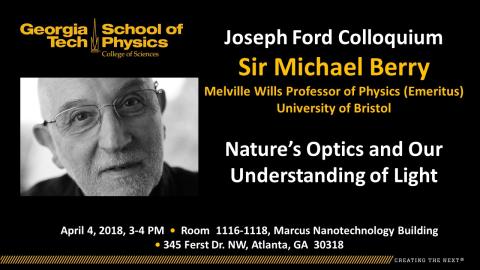event
Nature's Optics and Our Understanding of Light
Primary tabs
A School of Physics Joseph Ford Colloquium with Sir Michael Berry
Optical phenomena visible to everyone abundantly illustrate important ideas in science and mathematics. The phenomena considered include rainbows, sparkling reflections on water, green flashes, earthlight on the moon, glories, daylight, crystals, and the squint moon. The concepts include refraction, wave interference, numerical experiments, asymptotics, Regge poles, polarization singularities, conical intersections, and visual illusions.
About the Speaker
Sir Michael Berry is a theoretical physicist known for his research in the ‘borderlands’ between classical and quantum theories and ray and wave optics. His emphasis is on geometrical singularities such as ray caustics and wave vortices.
Berry discovered the geometric phase, a phase difference arising from cyclically changing conditions, with applications in many areas of wave physics, including polarisation optics, condensed matter, and self-propulsion of animals and robots.
He delights in finding the arcane in the mundane: mathematical singularities in rainbows and the dancing lines at the bottom of swimming pools; the twists and turns of a belt that underlie the quantum behaviour of identical particles; a laser pointer shone through bathroom window glass to demonstrate abstract aspects of wave interference; and oriental magic mirrors, illustrating the mathematical Laplace operator.
Berry has received numerous awards, including the Maxwell Medal and the Dirac Medal of the Institute of Physics, the Royal Society’s Royal Medal, the London Mathematical Society’s Pólya Prize, the Wolf Prize, and the Lorentz Medal. He serves on scientific committees of various institutes. He was knighted in 1996.
About the Joseph Ford Commemorative Lecture
Joseph Ford was one of the pioneers in the field of chaotic dynamics in the 1960s. He spent most of his 34-year career furthering the discipline at the Georgia Tech School of Physics. He dedicated his time between research, isupported largely by the National Science Foundation, and education, through conferences or in the classroom. This commemorative lecture is named to honor Ford's memory and influence as a scientist, teacher, and colleague in Georgia Tech and the scientific global community.
Status
- Workflow status: Published
- Created by: sniebuhr3
- Created: 03/08/2018
- Modified By: sniebuhr3
- Modified: 04/02/2018
Categories
Keywords
User Data
Target Audience

